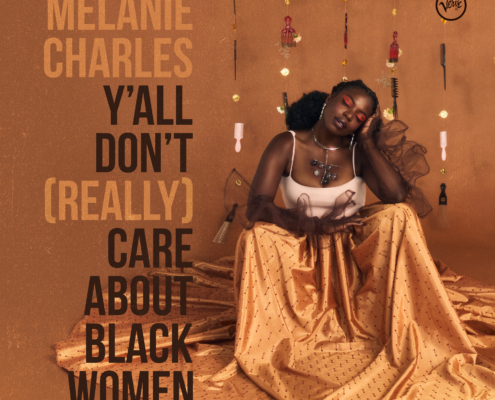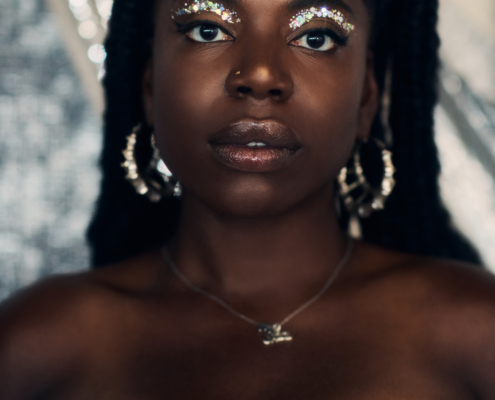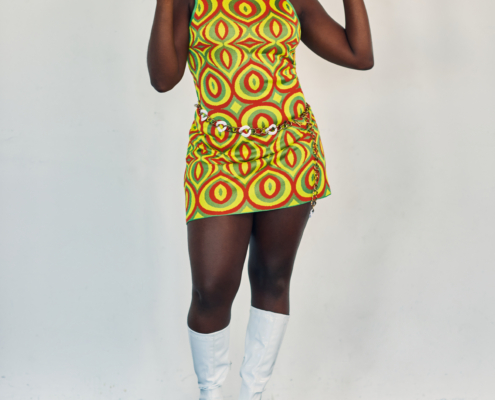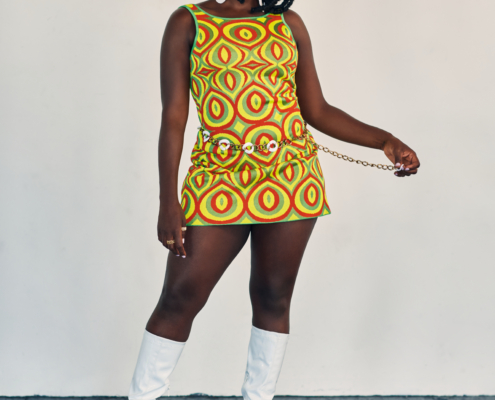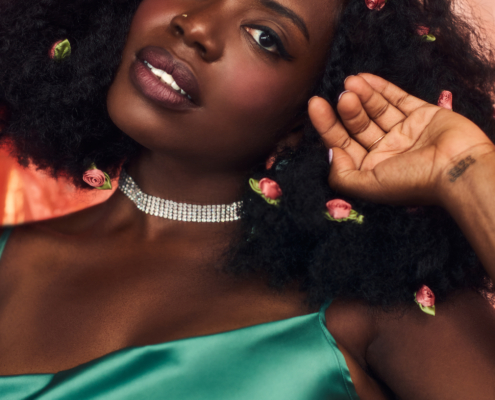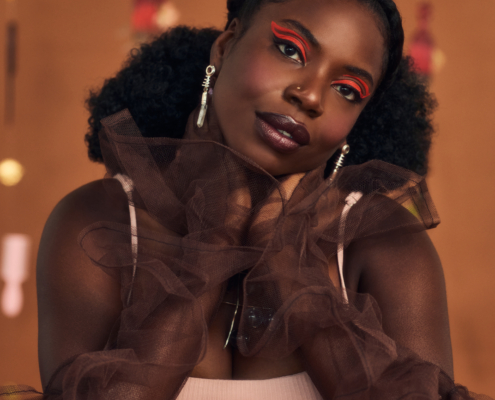Melanie Charles – Y’all Don’t (Really) Care About Black Women
- God Bless The Child (Billie Holiday/Arthur Herzog Jr.)
- Perdido (Reimagined) DINAH WASHINGTON (Hans Lengsfelder/Ervin M. Drake/Juan Tizol)
- Detour Ahead (Reimagined) SARAH VAUGHAN (Lou Carter/Herb Ellis/John Freigo)
- All Africa (The Beat) (Max Roach & Oscar Brown)
- The Music Is The Magic (Abbey Lincoln)
- Pay Black Women Interlude (Melanie Charles)
- Woman Of The Ghetto (Reimagined) MARLENA SHAW (Richard Evans/Robert Miller/ Marlena Shaw)
- Jazz (Ain’t Nothing But Soul) (Reimagined) BETTY CARTER (Norman Mapp/Jesper Nordenström/Anders Christensen/Kresten Osgood)
- Go Away Little Boy (Carole King/ Gerry Goffin)
- What A Difference (Reimagined) DINAH WASHINGTON (Maria Grever/Stanley Adams)
- Beginning To See The Light (Reimagined)
ELLA FITZGERALD (Duke Ellington/Johnny Hodges/ Don George/Harry James)
Melanie Charles – vocals, keyboards, flute & arrangements
Dezron Douglas, Tony Garnier – bass, Marcus Gilmore – drums, Rogerst Charles – sax, u.a.
Produced by Melanie Charles
„Jazz Ain’t Nothing But Soul” sang die große Betty Carter einmal. An diesem Motto kann niemand etwas auszusetzen haben, am allerwenigsten die singende Multiinstrumentalistin Melanie Charles, die unter dem kampfeslustigen Titel “Y’All Don’t (Really) Care About Black Women” ihr erstes Album bei Verve Records vorlegt.
Um zu demonstrieren, worum es ihr mit diesem Titel und dem dazugehörigen Album geht, versammelt sie darauf große Songs schwarzer Jazzsängerinnen und lädt einige davon sogar als Gaststars ein (natürlich nur virtuell via ausgefeilter Samples). Neben der o.g. Betty Carter sind auch andere schwarze weibliche Gesangsikonen aus dem Hause Verve dabei, nicht zuletzt natürlich Billie, Ella und Sarah.
Bislang dürften noch nicht allzu viele den Namen der in Brooklyn ansässigen Künstlerin mit haitianischen Wurzeln kennen. Und das, obwohl er in den vergangenen zehn Jahren schon auf Alben von u.a. Nicola Conte, den Gorillaz, Marcus Strickland’s Twi-Life und Kassa Overall aufgetaucht ist. Mit der (noch) relativen Unbekanntheit der Sängerin, Multiinstrumentalistin und Songschreiberin dürfte es aber sicher bald vorbei sein. Denn nach zwei Einspielungen für eher obskure Indie-Labels dürfte Melanie Charles ihr Album und der Plattenvertrag bei Verve Records einige Aufmerksamkeit verschaffen.
Gemeinsam mit u.a. Dezron Douglas und Tony Garnier (Bässe), Marcus Gilmore (Drums) und ihrem Bruder Rogerst Charles (Altsax) verleiht sie den Jazz- und Soulklassikern einen dezidiert zeitgenössischen Anstrich, der nicht zuletzt ein jüngeres Publikum ansprechen dürfte. Exemplarisch für die Vorgehensweise ist ihre mitreißende Neuinterpretation von Marlena Shaws 1969er Hit “Woman Of The Ghetto”. Die hypnotisierende, funky Bassline, die einem lange nicht wieder aus dem Ohr geht, hat sie vom Original übernommen, doch durch ihre Stimme und die Harfe von Gaststar Brandee Younger erhält die schon mehrfach gecoverte Nummer eine ganz eigene Note. VIDEO HIER ANSEHEN!
INFO
There are very few artists whose sound can capture the sentiments of a generation. The Brooklyn born and raised, Melanie Charles, is one of these artists. Over the past few decades, she has made a name for herself through dynamic engagements with jazz, soul and R&B. Her bold genre-bending style has been embraced by a range of artists including Wynton Marsalis, SZA, Mach-Hommy, Gorillaz and The Roots. In 2021, she appeared on NPR’s Tiny Desk and stunned with her eclectic style. Through it all, she has remained committed to making music that pushes listeners to consider new possibilities—both sonically and politically. “Make Jazz Trill Again,” a project that she launched in 2016, demonstrates her allegiance to everyday people, especially the youth and is focused on taking jazz from the museum to the streets. “I love jazz, I really fell in love with it deeply. But I was interested in young people interacting with it,” Charles says. The album Y’all Don’t (Really) Care About Black Women is reflective of Charles’ tremendous versatility and imagination as an artist but of also her deep care for community.
Charles’ initial approach to the album was simple—to find music in the Verve catalogue that spoke to her. As a Verve remix project, with Y’all Don’t (Really) Care About Black Women she set out to take this group of songs and breathe new energy into them. She was immediately drawn to the rapturous voices of Billie Holiday and Sarah Vaughn who inspired her to record arrangements of “God Bless the Child” and “Detour Ahead.” By the time she was ready to move forward with recording the rest of the album, the world had transformed into a very different place. When the pandemic hit, Charles was faced with a new set of concerns. She no longer had access to the same resources and was forced to make the album from home. Charles was not discouraged. “This is at the center of our experience as brown and Black people, making something out of nothing,” she says.
The remainder of the album was recorded during the summer of 2020 while the pandemic continued and Americans were in the throes of a racial reckoning sparked by the deaths of George Floyd, Breonna Taylor and others. Taylor’s death, in particular, had an impact on Charles’ creative process. “I was rudely reminded that Black women are and always have been undervalued, uncared for, unprotected and neglected. I decided to focus on songs written and or sung by the Black women who paved the way for me,” says Charles. Y’all Don’t (Really) Care About Black Women is a love letter to the unheralded labor of Black women. At the same time, it asks listeners, as they consume the artistic production of Black women—the likes of Ella Fitzgerald, Sarah Vaughan, Abbey Lincoln and Dinah Washington and others—to be accountable to and care about them as well.
Although Charles may be new to some, she has held a long spanning relationship with music that goes back to girlhood. She was raised by a Haitian mother in Brooklyn where the sound waves in their home was filled with artists like Johnny Hodges, Frank Sinatra, Chaka Khan, Anita Baker, John Coltrane and Nat King Cole. She attended the famed arts high school, LaGuardia High School for the Performing Arts where she studied flute and vocals. Her early life was full of stage performances; as a kid she participated in musical theater, pageants and talent shows in New York City. Eventually, she landed at the School of Jazz and Contemporary Music at The New School for college where she met artists like singer, songwriter, and record producer Jesse Boykins III and alto saxophonist Lakecia Benjamin. Perhaps better known as a singer, Charles has earned her title as a bonafide flautist. Her playing adds vibrant swaths of color and emotional texture to her music.
The album opens with a breathtaking rendition of Billie Holiday’s “God Bless the Child.” This song, and the album overall, flexes Charles’ impressive arrangement skills. The song features a powerful group of musicians—Benjamin Julia on electric guitar, Dezron Douglas on upright bass, Anwar Marshall on drums, Shedrick Mitchell on organ, and Tayzaro on cello. On flute and vocals, Charles floats above the soulful current of the band, singing the song over a dramatic blanket of electronic sound. The lyrics ring with equal power as the music. When Charles sings the lines “Yes, the strong get more/ While the weak one’s fade,” the connection to Black women’s struggle is palpable. “My experience moving in the world as a Black girl has always been, I have to be strong. I have to keep it together; I have to sort of live up to the standard,” says Charles.
At its core, Y’all Don’t (Really) Care About Black Women is a clarion call for a more intersectional vision of the world in which Black women can live more freely and express their full humanity.. The interlude “Pay Black Women” offers the most explicit instruction on some of the ways that care can be expressed. It contains a sample from a film project produced by Charles in 2021 entitled Love Letter to Black Jazz Girls. Through the voices of three Black women, the track draws attention to the racial gender wage gap but also to the treatment of Black women artistic producers more broadly.
“Go Away Little Boy” is an inventive interpretation of a tune that was originally recorded by soul singer, Marlena Shaw in the late1960s. Charles transforms the whimsy of the Shaw’s version into a slow and sensuous 90s R&B groove. The song touches on some of the more intimate dimensions of Black womanhood—romantic longing, desire, and difficult love. Likewise, in “Perdido” Charles sings about lost love with Dinah Washington’s voice deftly sampled throughout. Washington’s voice trails through the tune as Charles leads us through a bright, beat-clapping twist on the jazz standard.
In this fresh compilation, Charles leaves listeners with a powerful statement on what solidarity with Black women can look like. It includes not only care and attention to the everyday struggles that animate Black women’s lives but also to the beauty and joy as well. The album closes with her interpretation of “Beginning to See the Light” originally sung by Ella Fitzgerald. In this final provocation, Charles transforms Fitzgerald’s laid back swing into a hip-popping jaunt. “I just see people twerking to [it],” says Charles.
TRACK BY TRACK
- God Bless the Child (Billie Holiday)
A song that was meaningful to her as a child. She takes the somber classic and transforms it with a feeling of hopefulness. Her rendition is draws from the dramatic energy of Prince.
- Perdido (Dinah Washington)
“I always loved the ‘Perdido,’” says Charles. A fresh take on a jazz standard that she has listened to sing she was a kid. “All of the songs are songs that I shared with my mom and my brother in the car to school.”
- Detour Ahead (Sarah Vaughan)
Captures her personal experiences with heartbreak and unrequited love—at the romantic, familial and societal levels. “A lot of Brown skinned girls struggle with issues of desirability and feeling loved and supported and cared for…the feeling of like, is anyone really caring for me?” “‘Detour Ahead,’ for me was a very medicinal song for me long before I knew I was going to work on this project,” says Charles.
- All Africa (Abbey Lincoln + Max Roach)
Features a drum duet with Anwar Marshall. Charles sings a powerful rendition of the song that speaks to the current political moment. Set against the backdrop of present day social struggles—Black Lives Matter, #MeToo and #SayHerName—“All Africa,” which was originally recorded by Abbey Lincoln in the 1960s, rings as an anthem of resistance. “I feel like, what I’m saying is the same thing that Nina was saying, like, literally. It wasn’t an easy journey for her and it’s so far, it hasn’t been easy for me, either. But I guess I can see the blessing in the sweet struggle.”
- The Music Is The Magic (Abbey Lincoln)
A continuation of the rock infused soul groove in “All Africa.” Charles has performed this song live and wanted the recorded version of it to have that same kind of real time energy.
- Pay Black Women (Interlude)
A powerful commentary on a landscape that often undervalues women’s (but particularly Black women’s) labor. Voices of three Black women—Salenta Baison, KeyiaA and Rena Anakwe—casually cut between the propulsive energy of the straight-ahead jazz sound of the band. The song calls for better treatment of Black women in the entertainment business and beyond. It ends on a note of celebration of Black resilience and joy in spite of struggle.
- Woman Of The Ghetto (Marlena Shaw)
“I chose ‘Woman Of The Ghetto’ because it’s lyrically relevant,” Charles notes. “And while we were in lockdown, a conversation that we were having was about how kids who were poor children who did not have access to computers or internet were struggling to sustain their education in the midst of lockdown. I also wanted to highlight how you can come from the ghetto or from the hood, but present more than just the stereotype of the ghetto. Marlena Shaw was such a classy, refined, educated, well-spoken Black woman, speaking about the hood. And I think when we discuss the hood it’s sort of like a caricature of us. But actually, we’re so dynamic—we’re multifaceted. Where we’re from doesn’t define how we move in the world.”
- Jazz (Ain’t Nothing But Soul) [Betty Carter]
As she sings, “Jazz (Ain’t Nothing But Soul), a tune originally recorded by Betty Carter, Charles aptly reminds us of the lively spirit that lies at the heart of jazz music. It’s “makin’ do with ‘taters and grits,” “telling folks ‘bout what’s on your mind.” Jazz is “all the truth to be found.” Y’all Don’t (Really) Care About Black Women invites listeners to embrace this sense of expansiveness. As Charles puts it: “There’s a spectrum of what [jazz] sounds like, and what that looks like, which is really beautiful.”
- Go Away Little Boy (Go Away Little Boy) (Marlena Shaw)
A relatable song about the complexities and challenges of Black love. “[Sometimes] Black women are more financially stable [and can] compromise to be with a Black man. [But] by the end, it’s like, I beg you to stay because no matter how complicated it is, the love is just so potent.”
- What a Difference (Dinah Washington)
The dreamy and dissonant track that features Charles’ flute playing. Her brother, Rogerst Charles (alto saxophone) accompany Dinah Washington as she sings the melody.
- Beginning to See the Light (Ella Fitzgerald)
A song that samples and seamlessly moves through multitude of musical impulses—pop, swing, hip hop. By incorporating elements of Ella Fitzgerald’s voice in the song, it “allowed [her] to be in conversation with these musical ancestors while respectfully collaging and reworking the sounds they left behind.”
Weitere Infos in unserem Presseportal unter
https://journalistenlounge.de – bitte dort über den Genrefilter „Jazz“ anwählen!
Radio-Kontakte
Media Promotion (Promotion Süd, West & Nord)
Rosita Falke
info@rosita-falke.de, Tel: 040 – 413 545 05
Verve Records / Universal Music
CD 06024 3846757 0 / LP 06024 3846757 0
VÖ: 12.11.2021
Live
| 07.05.22 | Berlin | X Jazz Festival, Lido |
| 10.05.22 | München | Unterfahrt |
| 14.05.22 | Halle/S. | Woman in Jazz, G.-F.-Händel-Halle |

